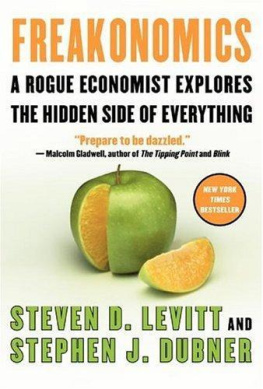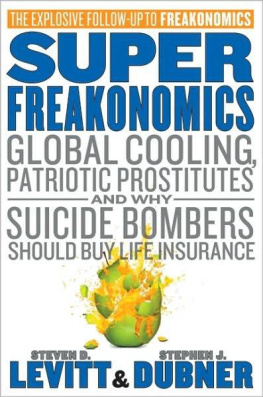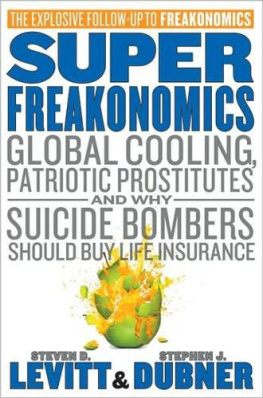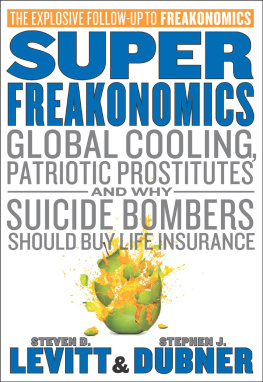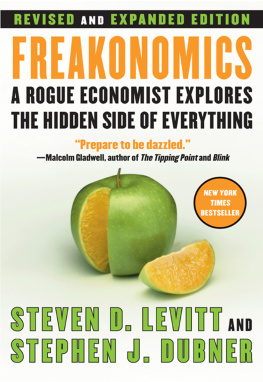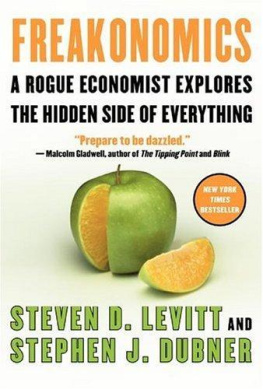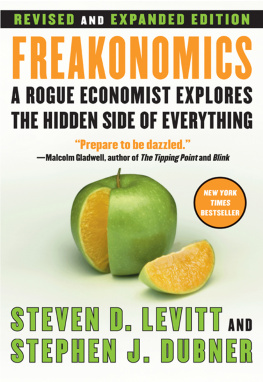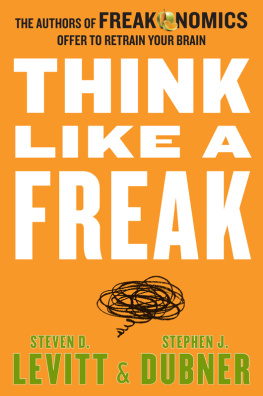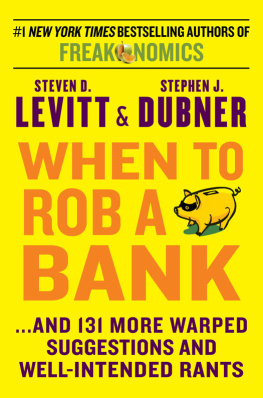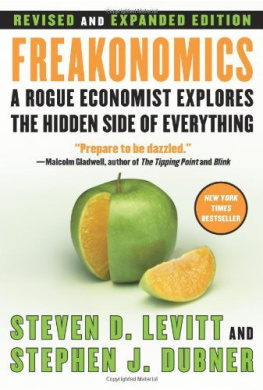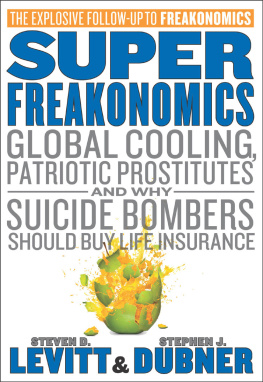FREAKONOMICS: A Rogue Economist Explores the Hidden Side of Everything
FREAKONOMICS: A Rogue Economist Explores the Hidden Side of Everything
By Levitt, Steven
AN EXPLANATORY NOTE
The most brilliant young economist in America-the one so deemed, at least, by a jury of his elders-brakes to a stop at a traffic light on Chicagos south side. It is a sunny day in mid-June. He drives an aging green Chevy Cavalier with a dusty dashboard and a window that doesnt quite shut, producing a dull roar at highway speeds.
But the car is quiet for now, as are the noontime streets: gas stations, boundless concrete, brick buildings with plywood windows.
An elderly homeless man approaches. It says he is homeless right on his sign, which also asks for money. He wears a torn jacket, too heavy for the warm day, and a grimy red baseball cap.
The economist doesnt lock his doors or inch the car forward. Nor does he go scrounging for spare change. He just watches, as if through one-way glass. After a while, the homeless man moves along.
He had nice headphones, says the economist, still watching in the rearview mirror. Well, nicer than the ones I have. Otherwise, it doesnt look like he has many assets.
Steven Levitt tends to see things differently than the average person. Differently, too, than the average economist. This is either a wonderful trait or a troubling one, depending on how you feel about economists.
-The New York Times Magazine, August 3, 2003
In the summer of 2003, The New York Times Magazine sent Stephen
J. Dubner, an author and journalist, to write a profile of Steven
D. Levitt, a heralded young economist at the University of Chicago.
Dubner, who was researching a book about the psychology of money, had lately been interviewing many economists and found that they often spoke English as if it were a fourth or fifth language. Levitt, who had just won the John Bates Clark Medal (awarded every two years to the best American economist under forty), had lately been interviewed by many journalists and found that their thinking wasnt very robust, as an economist might say.
But Levitt decided that Dubner wasnt a complete idiot. And Dubner found that Levitt wasnt a human slide rule. The writer was dazzled by the inventiveness of the economists work and his knack for explaining it. Despite Levitts elite credentials (Harvard undergrad, a PhD from MIT, a stack of awards), he approached economics in a notably unorthodox way. He seemed to look at things not so much as an academic but as a very smart and curious explorer-a documentary filmmaker, perhaps, or a forensic investigator or a bookie whose markets ranged from sports to crime to pop culture. He professed little interest in the sort of monetary issues that come to mind when most people think about economics; he practically blustered with self-effacement. I just dont know very much about the field of economics, he told Dubner at one point, swiping the hair from his eyes. Im not good at math, I dont know a lot of econometrics, and I also dont know how to do theory. If you ask me about whether the stock markets going to go up or down, if you ask me whether the economys
going to grow or shrink, if you ask me whether deflations good or bad, if you ask me about taxes-I mean, it would be total fakery if I said I knew anything about any of those things.
What interested Levitt were the stuff and riddles of everyday life. His investigations were a feast for anyone wanting to know how the world really works. His singular attitude was evoked in Dubners resulting article:
As Levitt sees it, economics is a science with excellent tools for gaining answers but a serious shortage of interesting questions. His particular gift is the ability to ask such questions. For instance: If drug dealers make so much money, why do they still live with their mothers? Which is more dangerous, a gun or a swimming pool? What really caused crime rates to plunge during the past decade? Do real-estate agents have their clients best interests at heart? Why do black parents give their children names that may hurt their career prospects? Do schoolteachers cheat to meet high-stakes testing standards? Is sumo wrestling corrupt?
And how does a homeless man in tattered clothing afford $50 headphones?
Many people-including a fair number of his peers-might not recognize Levitts work as economics at all. But he has merely distilled the so-called dismal science to its most primal aim: explaining how people get what they want. Unlike most academics, he is unafraid of using personal observations and curiosities; he is also unafraid of anecdote and storytelling (but he is afraid of calculus). He is an intuitionist. He sifts through a pile of data to find a story that no one else has found. He figures a way to measure an effect that veteran economists had declared unmeasurable. His abiding interests-though he says he has never trafficked in them himself-are cheating, corruption, and crime.
Levitts blazing curiosity also proved attractive to thousands of New York Times readers. He was beset by questions and queries, riddles and requests-from General Motors and the New York Yankees and U.S. senators but also from prisoners and parents and a man who for twenty years had kept precise data on his sales of bagels. A former Tour de France champion called Levitt to ask his help in proving that the current Tour is rife with doping; the Central Intelligence Agency wanted to know how Levitt might use data to catch money launderers and terrorists.
What they were all responding to was the force of Levitts underlying belief: that the modern world, despite a surfeit of obfuscation, complication, and downright deceit, is not impenetrable, is not unknowable, and-if the right questions are asked-is even more intriguing than we think. All it takes is a new way of looking.
In New York City, the publishers were telling Levitt he should write a book.
Write a book? he said. I dont want to write a book. He already had a million more riddles to solve than time to solve them. Nor did he think himself much of a writer. So he said that no, he wasnt interested-unless, he proposed, maybe Dubner and I could do it together.
Collaboration isnt for everyone. But the two of them-henceforth known as the two of us-decided to talk things over to see if such a book might work. We decided it could. We hope you agree.
Levitt had an interview for the Society of Fellows, the venerable intellectual clubhouse at Harvard that pays young scholars to do their own work, for three years, with no commitments. Levitt felt he didnt stand a chance. For starters, he didnt consider himself an intellectual. He would be interviewed over dinner by the senior fellows, a collection of world-renowned philosophers, scientists, and historians. He worried he wouldnt have enough conversation to last even the first course.
Disquietingly, one of the senior fellows said to Levitt, Im having a hard time seeing the unifying theme of your work. Could you explain it?
Levitt was stymied. He had no idea what his unifying theme was, or if he even had one.
Amartya Sen, the future Nobel-winning economist, jumped in and neatly summarized what he saw as Levitts theme.
Yes, Levitt said eagerly, thats my theme.
Another fellow then offered another theme.
Youre right, said Levitt, thats my theme.
And so it went, like dogs tugging at a bone, until the philosopher Robert Nozick interrupted.
How old are you, Steve? he asked.
Twenty-six.
Nozick turned to the other fellows: Hes twenty-six years old. Why does he need to have a unifying theme? Maybe hes going to be one of those people whos so talented he doesnt need one. Hell take a question and hell just answer it, and itll be fine.
-THE NEW YORK TIMES MAGAZINE, AUGUST 3, 2003

